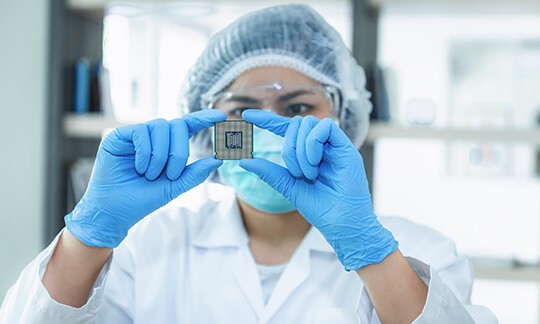
AI SoC Testing Challenges & How to Solve for Them
TREND INSIGHT
MIXED SIGNAL IC VALIDATION | 7 MINUTE READ
Learn about the challenges of AI SoC testing, ensuring efficiency, reliability, and adaptability for evolving semiconductor technology.
Artificial intelligence (AI) software demands increasingly sophisticated and powerful hardware to handle the complex computations and vast data processing requirements it entails. Traditional hardware architectures struggle to meet these demands because of their inherent limitations, which is where System-on-a-Chip (SoC) semiconductors come into play. They have become increasingly crucial in meeting demands since they can integrate multiple functions, such as processing, memory, and connectivity, into a single, compact chip. This integration allows for higher performance, lower power consumption, and smaller physical size, making SoCs an ideal solution for AI applications.
Despite the capabilities of the SoC chips, engineers face major challenges when it comes to testing AI SoC chips including ensuring performance accuracy, managing power consumption, verifying complex functionality, and maintaining security and reliability.
What is an AI Chip?
An “AI chip” refers to a specialized type of semiconductor designed to accelerate artificial intelligence workloads, such as machine learning and deep learning tasks. They are typically focused on SoC semiconductors because all the necessary components are on a single chip, which allows for optimized performance and efficiency in handling AI algorithms. In addition to SoCs, AI chips can also be application-specific integrated circuits (ASICs) that are custom-built for specific AI applications, offering tailored performance enhancements for tasks such as neural network processing and data analysis.
AI chips differ from traditional semiconductors in their architecture and functionality. Traditional semiconductors, like general-purpose CPUs and GPUs, are designed to handle a broad range of computing tasks, while AI chips are optimized for the specific demands of AI workloads, such as high-speed mathematical computations, real-time data processing, and machine learning algorithms. AI chips often incorporate dedicated hardware for matrix multiplication, tensor operations, and other computations common in AI algorithms, enabling faster and more efficient processing. This specialization allows AI chips to deliver significantly higher performance and energy efficiency for AI applications compared to traditional semiconductors.
AI chips can be further categorized into AI training chips and AI inference chips based on their intended use. These chips serve different purposes in the AI lifecycle. AI training chips are used during the model training phase, where they process large amounts of data to learn patterns and make predictions. These chips are optimized for high computational power and memory bandwidth to handle the intensive workloads of training large-scale AI models. In contrast, AI inference chips are used to apply the trained models to new data to make predictions or decisions. Inference chips are optimized for low latency and energy efficiency, making them suitable for edge devices and real-time applications such as autonomous vehicles, smart cameras, and voice assistants.
10 Challenges of AI SOC Semiconductor Testing
Testing AI SoC semiconductors presents a multitude of challenges that engineers must navigate to ensure optimal performance and reliability.
1. Performance Accuracy—Ensuring the performance accuracy of AI SoC semiconductors is critical. Engineers must verify that the chip accurately processes AI workloads, maintaining precision in computations such as matrix multiplications and tensor operations. Any deviation can lead to incorrect model predictions and degraded AI performance, necessitating rigorous testing and validation protocols.
2. Power Consumption—Managing power consumption is a significant challenge, as AI SoCs need to balance high performance with energy efficiency. Engineers must test for optimal power usage under various workloads to prevent overheating and ensure longevity. These tests involve implementing and verifying power-management techniques that do not compromise the chip's processing capabilities.
3. Complex Functionality Verification—AI SoCs integrate numerous functionalities, such as processing units, memory, and communication interfaces, into a single chip. Verifying the correct operation of all these components is complex and time-consuming. Engineers must conduct comprehensive tests to ensure that each function works as intended and that there are no conflicts or bottlenecks in the integrated system.
4. Security and Reliability—Ensuring the security and reliability of AI SoCs is paramount, especially when they are used in critical applications like autonomous vehicles and healthcare devices. Engineers must test for vulnerabilities that could be exploited by malicious actors, as well as ensure the chip can operate reliably under various conditions. These tests can include extensive stress testing and security assessments.
5. Scalability—AI workloads can vary significantly in size and complexity, so AI SoCs must be scalable to handle different levels of demand. Engineers face the challenge of testing the chip's scalability, ensuring it can efficiently process both small and large datasets without performance degradation. The engineers must test the SoC under various scenarios to validate its adaptability.
6. Thermal Management—High computational loads on AI SoCs generate substantial heat, necessitating effective thermal management. Engineers must design and test cooling solutions to prevent overheating, which can affect performance and cause hardware failures. Tests involve simulating real-world usage conditions and ensuring that the chip maintains safe operating temperatures.
7. Interoperability—AI SoCs often need to work in conjunction with other hardware and software systems. Ensuring interoperability with a wide range of devices and platforms is a significant challenge. Engineers must test the chip's compatibility with different operating systems, communication protocols, and peripheral devices to ensure seamless integration.
8. Manufacturing Variability—Variations in the manufacturing process can lead to inconsistencies in the performance and quality of AI SoCs. Engineers must account for these variabilities during testing, ensuring that all chips meet the required standards despite slight differences in production. Testing can involve rigorous quality control and testing across multiple production batches.
9. Latency Optimization—Many AI applications, particularly those requiring real-time processing, demand low latency. Engineers must optimize the AI SoC to minimize delays in data processing and response times. This optimization requires testing the chip's performance under conditions that mimic real-time usage to identify and mitigate sources of latency.
10. Software Integration—AI SoCs need to run AI algorithms efficiently, which requires seamless software integration. Engineers must test the compatibility and performance of AI software on the chip, ensuring that the algorithms leverage the hardware's capabilities effectively. Engineers typically must closely collaborate with software developers to optimize code and firmware for the specific architecture of the SoC.
How NI Supports Artificial Intelligence SoC Test
NI addresses the various challenges of AI SoC semiconductor testing through innovative solutions tailored to meet the demands of modern semiconductor validation. To ensure performance accuracy, NI leverages advanced test automation and data analysis tools that verify AI workloads are processed precisely, maintaining computation accuracy and avoiding performance degradation. Tools like LabVIEW and TestStand, and data management software like DIAdem, ensure precise AI workload processing and computational accuracy. By combining advanced test automation, AI data analytics, and robust data acquisition systems, NI provides a comprehensive framework for accurate and efficient AI semiconductor testing.
Scalable testing solutions enable AI SoCs to efficiently handle varying levels of demand across chips, validating their adaptability to different scenarios and ensuring consistent performance. Simulation tools and cooling solutions ensure safe operating temperatures during high computational loads, while tools for testing AI SoCs’ compatibility with various devices and systems, including different operating systems, communication protocols, and peripheral devices, ensure interoperability. In addition, NI solutions utilize reusable frameworks and standardized protocols, support complex functionality verification by enabling efficient testing of numerous integrated components in an AI SoC while emphasizing security and reliability through rigorous stress testing and security assessments to identify and mitigate vulnerabilities for dependable operation in critical applications.
To account for manufacturing variability, NI implements rigorous quality control and testing across multiple production batches, ensuring all chips meet required standards despite production inconsistencies. To optimize latency, solutions minimize delays in data processing, essential for real-time applications, by simulating real-world usage and identifying latency sources. NI provides tools and collaboration platforms for seamless software integration with AI SoCs, including test development, sequencing, and management software that help engineers optimize AI algorithms for the specific architecture of the SoC.
NI’s comprehensive approach ensures that AI SoC testing is efficient, reliable, and adaptable to the evolving demands of semiconductor technology. Discover how NI can support your semiconductor testing requirements.

